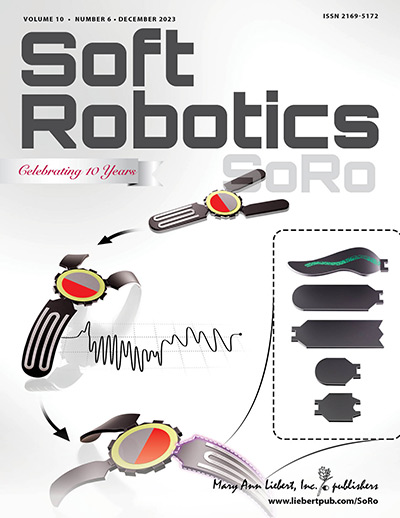基于形状记忆聚合物/钕铁硼复合材料的分段可控运动刚度可调磁致动器。
IF 6.1
2区 计算机科学
Q1 ROBOTICS
引用次数: 0
摘要
软磁机器人由于具有快速转换能力和可编程性,近年来引起了广泛的研究兴趣。虽然基体材料固有的柔软性使其具有灵巧性和安全的相互作用,但软基体易于变形与承载能力之间的矛盾,以及单个节段难以自主控制运动,严重限制了其设计空间和应用潜力。在此,我们提出了一种通过印刷电路原位焦耳加热来调整嵌入硬磁颗粒的形状记忆聚合物复合材料的模量的策略,该策略可以将刚度从25°C时的4.1 GPa可逆地改变为70°C时的10.9 MPa。刚度可调磁力机器人实现了快速可逆形状变换和高承载能力的兼容。此外,还设计了多个分离的焦耳电路,以实现各个部分的独立可控运动。利用焦耳加热和磁致动的仿真来指导器件的设计。本文提出的磁各向异性和磁刚度同步编程的概念,极大地拓展了磁致动器的设计空间和新应用,包括重载软爪和手指独立运动的仿生手。本文章由计算机程序翻译,如有差异,请以英文原文为准。
Stiffness Tunable Magnetic Actuators Based on Shape Memory Polymer/NdFeB Composite for Segmental Controllable Motion.
Soft magnetic robots have attracted extensive research interest recently due to their fast-transforming ability and programmability. Although the inherent softness of the matrix materials enables dexterity and safe interactions, the contradiction between the easy shape transformation of the soft matrices and load carrying capacity, as well as the difficulty of independently controllable motion of individual segments, severely limits its design space and application potentials. Herein, we have proposed a strategy to adjust the modulus of shape memory polymer composite embedded with hard magnetic particles by in situ Joule heating of printed circuit, which can reversibly change the stiffness from 4.1 GPa at 25°C to 10.9 MPa at 70°C. The stiffness tunable magnetic robots realize the compatibility of fast reversible shape transformation and high load carrying capacity. Furthermore, multiple separated Joule circuits are designed for the independently controllable motion of individual segments. The simulation of Joule heating and magnetic actuation is used to guide the design of devices. The concept of simultaneously programming magnetic anisotropy and stiffness proposed in this work greatly expands the design space and new applications of magnetic actuators, including soft grippers for heavy loads and bionic hand with independent motion of fingers.
求助全文
通过发布文献求助,成功后即可免费获取论文全文。
去求助
来源期刊

Soft Robotics
ROBOTICS-
CiteScore
15.50
自引率
5.10%
发文量
128
期刊介绍:
Soft Robotics (SoRo) stands as a premier robotics journal, showcasing top-tier, peer-reviewed research on the forefront of soft and deformable robotics. Encompassing flexible electronics, materials science, computer science, and biomechanics, it pioneers breakthroughs in robotic technology capable of safe interaction with living systems and navigating complex environments, natural or human-made.
With a multidisciplinary approach, SoRo integrates advancements in biomedical engineering, biomechanics, mathematical modeling, biopolymer chemistry, computer science, and tissue engineering, offering comprehensive insights into constructing adaptable devices that can undergo significant changes in shape and size. This transformative technology finds critical applications in surgery, assistive healthcare devices, emergency search and rescue, space instrument repair, mine detection, and beyond.
 求助内容:
求助内容: 应助结果提醒方式:
应助结果提醒方式:


